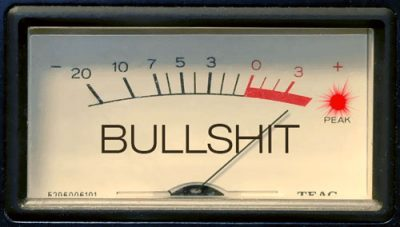What I originally wanted was to enrich my life with reproduced music in the home. What I've learned in my pursuit of more enrichment through higher fidelity is that there seems to be a point in the fidelity where it works in terms of getting me psychologically to the place where I want the music to take me, and the required fidelity isn't nearly as high as I had imagined in the beginning. Fidelity became a hobby in itself for me, with no particular goal in mind other than to discover what different things sounded like. I've learned what horns can do, steep slopes on active crossovers, 5 way vs 2 way speakers, multi-channel systems, crosstalk reduction schemes, cables, dacs, amps, etc. It's all been interesting but going back to the original goal of life enrichment through music reproduction in the home, I'm pretty much all the way there with a couple of decent low-end bookshelf speakers and a cheap AV receiver. For me, the message in the music is quite robust against playback issues. Hearing fine details, exquisite dynamics and naturalness and purity of tone and timing, those things are all fun and interesting and quite gratifying to achieve but actually add little to my enjoyment of the music. It's kind of like reading a story from a leather bound book that has really nice typesetting and high quality paper. It's nicer than reading the same story from a cheap paperback book, but it really doesn't add to the story.
So with this dualistic sense of musical enjoyment vs. sound quality, I know that I want my system to allow me to enjoy music, which is easy, but I also want it to please me with beautiful sound, which is also easy but not easy to maximize. What might please me most is always the question. I haven't heard all there is to hear. I have been for years very much pleased and fascinated by the effect of reducing inter-aural crosstalk while listening to stereo, so I'm exploring ways to maximize that in an optimal way, with minimal side effects and inconveniences. I have some ideas I'm excited to try out, and they will require some DIY work on my part. I get to craft things that can't be bought, and I enjoy dreaming up methods and bringing them to reality, so I guess that's another thing I get from audio.
So with this dualistic sense of musical enjoyment vs. sound quality, I know that I want my system to allow me to enjoy music, which is easy, but I also want it to please me with beautiful sound, which is also easy but not easy to maximize. What might please me most is always the question. I haven't heard all there is to hear. I have been for years very much pleased and fascinated by the effect of reducing inter-aural crosstalk while listening to stereo, so I'm exploring ways to maximize that in an optimal way, with minimal side effects and inconveniences. I have some ideas I'm excited to try out, and they will require some DIY work on my part. I get to craft things that can't be bought, and I enjoy dreaming up methods and bringing them to reality, so I guess that's another thing I get from audio.







